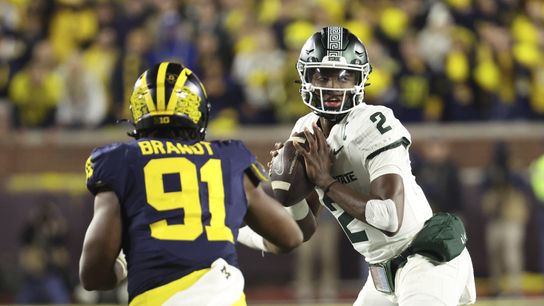"So many vows...they make you swear and swear. Defend the king. Obey the king. Keep his secrets. Do his bidding. Your life for his. But obey your father. Love your sister. Protect the innocent. Defend the weak. Respect the gods. Obey the laws. It's too much. No matter what you do, you're forsaking one vow or the other.”
Ser Jamie "The Kingslayer" Lannister was not speaking specifically about the predicament Michigan and Michigan State may soon find themselves if House Bill No. 4643 passes when speaking in George R.R. Martin's classic A Clash of Kings, but the situation applies.
Four state lawmakers in Michigan have authored HB 4643 in an attempt to exempt the state's universities from any rules and accountability that may prevent Michigan or Michigan State from paying players or recruits as much as they would like, and also stop any entity from punishing those schools for violating any rules.
There's nothing new to that. The NIL era was born in 2019 via a state law in California, and various state legislatures have been trying to give their schools advantages ever since under the widely-recognized legal theory commonly known as "My dad can beat up your dad."
The difference here is that Michigan's HB 4643 goes one step further. It would prohibit the requirement to report NIL deals to the NCAA or any associated entity which, in case you haven't been paying attention, is the entire idea behind the new College Sports Commission.
Not only are schools now required to report any NIL deal of at least $600 to the CSC, soon the Power 4 conferences will circulate a document that will basically serve as a blood oath to follow the rules established by the CSC, abide by any applicable punishments, and keep their mouths shut. Oh, and definitely don't try to sue their way out of it. As Yahoo Sports reported last month:
Officials from the Big Ten, SEC, Big 12 and ACC are circulating a draft of a groundbreaking and first-of-its-kind document intended to prevent universities from using their state laws to violate new enforcement rules and, in a wholly stunning concept, requires schools to waive their right to pursue legal challenges against the new enforcement entity, the College Sports Commission.
The document, now viewed by dozens of leading school administrators, would bind institutions to the enforcement policies, even if their state law is contradictory, and would exempt the CSC from lawsuits from member schools over enforcement decisions, offering instead a route for schools to pursue arbitration.
The schools would essentially be forced to sign the document, otherwise they'd run out of teams to play:
The consequence for not signing the agreement is steep: a school risks the loss of conference membership and participation against other power league programs.
“You have to sign it,” says one athletic director who has seen the document, “or we don’t play you.”
“As a condition of membership, you must comply with the settlement and enforcement,” says a power conference president with knowledge of the document.
New Michigan bill would BAN schools from complying with #NIL investigations and PROHIBIT requiring the reporting of NIL deals to the NCAA/CSC/Deloitte. Civil remedies are available for violations. Love this.https://t.co/cUuEG1XCwN pic.twitter.com/10HwWP9qzd
— Darren Heitner (@DarrenHeitner) June 19, 2025
So, what's a school to do if HB 4643 passes? Comply with their conference rules and defy state law? Or obey the law and risk expulsion from the Big Ten? Honor their father or protect the king?
Look, as we all learned from Schoolhouse Rock, the introduction of a bill is a long way from a passing a law. And this isn't even the first bill of its kind; Tennessee passed a similar law on May 1. As of now, the Volunteers and Commodores remain in the SEC. But then again, the CSC document remains unsigned.
It remains to be seen if the CSC and its associated agreements spawned by the House settlement will survive various legal challenges, and so it's not surprising to see state lawmakers run the same play that's worked so well the last six years or so. And while HB 4643 works its way through the Michigan state house in Lansing, it will be interesting to see if the Wolverines and Spartans flex their muscle to try to kill the bill or to get it passed.
